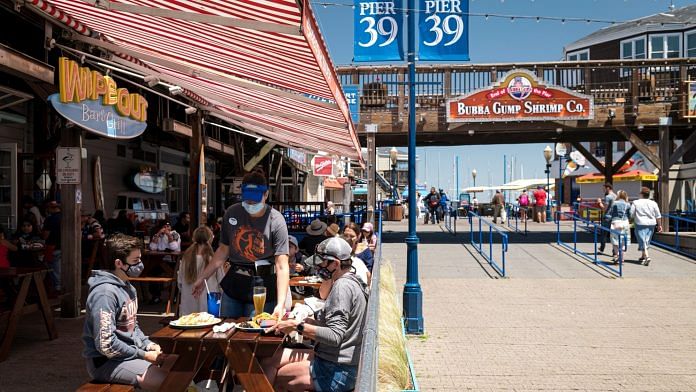The Lithuanian capital of Vilnius has become the poster child for how cities can embrace outdoor living and socializing as they come out of COVID-19 lockdown.
It’s been turned into a giant open-air cafe, with restaurants and bars spilling over into plazas, squares and 18 closed streets to enable responsibly distanced socializing.
Lithuania has had one of the lowest rates of infection in Europe, with just over 1,800 confirmed cases. The hospitality industry in the UNESCO-listed capital recently invited tourists to come back, with hot air balloons flying over the Old Town carrying the message “Vilnius is calling”.
From July, there will also be fewer cars in the city centre, as Vilnius brings in the permanent pedestrianization of four streets in the Old Town.
“Cars cannot dominate the most sensitive and beautiful part of our city – Vilnius is choosing to be a city of the future now,” said the city’s Mayor, Remigijus Šimašius.
Other cities around the world are now looking to Vilnius’ pivot to outdoors hospitality as a model to draw back customers and visitors for their own reopenings.
Could unlocking public spaces as real-estate assets to boost the economic recovery from COVID-19 usher in a new age of outdoor entertaining and change the way we use our cities?
The pub car park
When pubs and restaurants open in the United Kingdom on 4 July, they will be allowed to use car parks and sidewalks to cater for diners safely, while maintaining social distancing measures.
New laws have been introduced to make it simpler for pubs to serve alcohol outside of their premises, according to Bloomberg, and that pave the way for more street trading, fairs and markets.
Summer fairs and car boot sales will not require a planning application, Prime Minister Boris Johnson’s office said.
The Cartford Inn in Lancashire, north-west England, is installing greenhouses for diners to eat in, sheltered from the elements, in preparation for the 4 July opening.
Inspired by Amsterdam!
What I originally thought was hideous, I am now looking forward to opening them soon ? not in situ yet, but ideal for the more vulnerable guests. We will be taking bookings very soon ? pic.twitter.com/hhAgB2P00b— The Cartford Inn (@CartfordInn) June 16, 2020
In a Twitter post, they said they had taken inspiration from the quarantine greenhouses at Amsterdam’s Mediamatic arts centre.
Also read: Your country’s Covid management will decide how many tourists you will get
Reclaiming the streets
San Francisco’s Economic Recovery Task Force has set up Shared Spaces, a programme that allows businesses to use parts of outdoor public spaces – from sidewalks to plazas – with free, fast-tracked permits. In return, merchants have to maintain the pathways and ensure they’re accessible.
The programme will also enable expanded outdoor restaurant seating, once cleared by public health officials.
“The COVID-19 pandemic has drastically changed our relationship with our streets, open public spaces and public facilities,” Laura Petrella, chief of planning, finance and economy at UN-Habitat told the Thomson Reuters Foundation.
“Public space has emerged as a critical lifeline for cities and their residents.”
She said local authorities in Kisumu, Kenya, have converted public spaces into open-air markets; and streets in Kalaw, Myanmar, have been closed to allow for social distancing at vegetable markets.
Cleaner and greener
Streets across Europe are also being closed to traffic to allow people to cycle instead of take public transport – in what could be a major step towards easing pollution and a greener future. And from Barcelona to Bogota, miles of pop-up bike lanes have been appearing all over the world.
COVID-19 has seen the acceleration of some city centre transport initiatives that were already planned, too. The UK is investing around $2.4 billion in bike lanes and wider pavements to encourage more people to cycle and walk. More than $300 million of that was released early to enable emergency pop-up lanes.
What were initially temporary solutions to enable economic recovery and improve mobility and recreation could become permanent, urban planners predict.
Francesco Cerroni, an urban planner at Buro Happold, told Commercial Observer that what starts as a temporary solution or a test – closing a lane of traffic, for example – can become more permanent if it proves to be effective.
With decreasing car use a real possibility as people work from home, walk and cycle more, could this be the beginning of a more permanent trend of cities freeing up space for businesses and outdoor entertaining?
Kate Whiting, Senior Writer, Formative Content
This article was first published in World Economic Forum.
Also read: How Bali, a tourist hotspot, escaped becoming a virus hotspot



